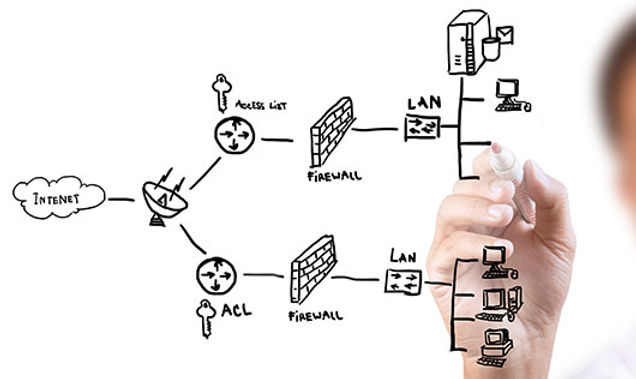- BTI Group
- IT Products Services Articles
- 6 min read
What is IT Vendor Management & How to Do IT Right

The purpose of IT vendor management is to ensure you achieve maximum gain, reliability, and quality for your IT vendor budget. Your vendor management strategy and execution toward those goals will be the sole determinant of your success in IT.
Let’s dive into the core aspects of IT vendor management, why it matters, and how to excel at it.
What is IT Vendor Management and Why is it Essential?
IT vendor management is the process of overseeing and coordinating relationships with the suppliers who provide your company with IT services and products. This includes not only IT consultants but also vendors providing:
- SaaS (Software as a Service)
- Data Centers
- Cloud services, or any hardware software or product that connects via an IP address to your network.
Other important vendors that should be thoroughly screened include:
- VoIP and Communications
- Building automation
- Burglar alarms
- Security cameras
- Access control systems
- Any production equipment you may monitor or connect to the Internet over your network
Any failure or negligence by any one of these suppliers could be the cause of an IT disaster.

For example, just prior to the first Trump inauguration, the United States Capital Police network was attacked and successfully downed due to negligent implementation of a new video camera system. His opponent, Hillary Clinton, was largely beaten in the election due to IT-related negligence. Many businesses have shut down due to failure in IT vendor management.
A well-organized IT vendor management strategy ensures your business has access to top resources, stays compliant with the latest industry regulations, operates efficiently, and reduces the risks associated with third-party vendors.
When effectively managed, the right vendors can offer innovative solutions while providing cost-efficient solutions. However, poorly managed vendor management can expose you to serious risks, including project delays, cost overruns, and even security breaches.
Choosing the Right IT Vendor: IT Vendor Management Best Practices
Key components of successful vendor management include:
Vendor Selection
The right vendor should be aligned with your business goals and available budget while clearly outlining the work they’ll be doing.
Contract Management
Efficient IT vendor contract management should:
- Set clear service standards (SLAs) for your vendors and make sure those standards are being met.
- Maintain your flexibility by avoiding vendor lock-in, so you can easily switch vendors when needed.
- Prevent extra costs by including pay-for-performance clauses in contracts when possible.
- Prevent price increase while avoiding auto-renewal clauses.
- Make sure your vendors have the proper insurance to cover issues like cyber security issues, general liability, and workers comp.
Vendor and System Performance Tracking
Regularly monitor how well your vendors are performing to ensure they are meeting their own productivity standards.
Cybersecurity and Compliance
Make sure your vendors follow best practices for cybersecurity, data protection, and industry regulations before working with them.
Key Components of IT Vendor Management
Communicate Clearly and Effectively
Many businesses struggle with vendor selection because they lack clarity about their goals and the criteria for success related to a product or service. To avoid this, your IT vendor management specialist must be able to translate your specific objectives and success criteria into a detailed and comprehensive project plan before finalizing an agreement.
You want to choose vendors with expertise and experience to ensure that you achieve your goals. The first test is whether they can duplicate your understanding or not. Many won’t have the expertise or experience with projects like yours to do so. The second test is whether you can reach an agreement on the scope and terms of the agreement – a vendor without any intention of you reaching your goals can’t or won’t put forth the effort to document and agree to them. The third test is an agreement to performance and performance monitoring. Many vendors exclude this from their terms and conditions.
In summary, most clients that come to us with repeated IT challenges are in that state because they didn’t ask the right questions, or they moved forward without getting the right answers in writing as part of their agreements.


Try Multiple Vendors
A comprehensive vendor selection process should evaluate multiple candidates not just on price, but on overall value. This includes factors like quality of support, features and benefits, scalability, flexibility, pricing transparency, and alignment with your business goals.
The Vital Importance of a Scope of Work for any Project
The scope of work defines what will be done and what results will be attained by each party to a contract for project work. In our business, we often see IT project work bids without any scope of work attached other than terms and conditions that favor the vendor.
The lack of a clear scope is responsible for a very high percentage of IT project failures. Clear and complete roles and responsibilities, exclusions and inclusions, and business deliverables desired are the key elements of a scope of work that will enable your project to succeed.
Monitor Your Vendors Performance
Avoiding a ‘set it and forget it’ approach is essential for success. Regular review meetings with vendors help maintain alignment and that potential issues are addressed before they escalate. A robust monitoring system that tracks performance and quality is essential. In my work, I’ve found that KPIs (Key Performance Indicators) play a vital role in objectively measuring vendor success.
When vendors are treated as partners, not mere service providers, the relationship becomes more productive, and both parties are more invested in mutual success.
IT Vendor Risk Management & Cybersecurity
Cybersecurity risks are a significant concern for IT vendor risk management. Each vendor you integrate into your ecosystem can introduce potential vulnerabilities. That’s why finding a balance between convenience and security is essential. Typically, higher security and lower risk translate into increased costs and reduced convenience. You probably don’t have the budget or time to audit all third-party vendors associated with your business – most businesses have hundreds of hardware and software suppliers and five to ten resellers and integrators working on their IT. Due to cost, most businesses and even governments only perform audits under rare circumstances.
Ensure your vendor insurance liability limits align with the potential costs you might experience if they fail. Insurance companies are doing audit work for you these days as part of underwriting your vendors. When the vendor can’t or won’t offer a satisfactory cert, you should go elsewhere or, if there is no other alternative, dig deep to understand your real risk. Insurance carriers increasingly will immediately drop or non-renew vendor cyber and professional liability coverage when negligence is found. Another effective strategy is to subscribe to a membership organization like IS Networld that vets suppliers across all forms of safety, insurance, and compliance standards tailored to your particular risk and safety profile.

Nothing will replace your diligence in vendor management, data protection, and information security. Most of the time, it’s the lack of responsible IT vendor management that results in your unreimbursable and uninsured loss. At BTI, we offer several key services that reduce risk and improve performance while reducing operating and compliance costs all at the same time.
In addition, assigning vendors into security tiers can help manage access to sensitive data and systems. Vendors with higher risks or more access to critical systems should be subjected to stricter security measures and more diligent controls and vetting, perhaps including penetration testing for them and their systems as well.
Lastly, it’s critical to have proactive system monitoring and reporting in place. Even after the initial vetting, vendors must be regularly reviewed to ensure they deliver while also remaining compliant and secure. If possible, invest in vendor management software that tracks vendor performance, contracts, and security audits in real time.
We offer such tools as part of our Remote Monitoring and Management as a Service offering.
Vendor Management Tools: Streamlining the Process
With the growing complexity in vendor relationships, vendor management services and software have evolved to help cut costs and ensure vendor performance. These services facilitate everything from contract and insurance management to performance tracking and compliance auditing.
Many of our largest clients use this service, which includes software and services from ISNetworld, for example. For our smaller clients subscribing to RMMAAS or GlobalView Support, we provide both the software tools and the service to do this.
Monitoring Vendor Performance: Ensuring Ongoing Value
Once a vendor is onboarded, your work isn’t done. Ongoing monitoring is critical to ensuring that vendors continue to deliver value and meet their contractual obligations. Performance should be tracked through metrics like:
- Delivery timelines
- Cost efficiency
- Quality of service
- Compliance with SLAs
Implementing a vendor performance review cycle, whether quarterly or annually, allows you to continuously assess whether your vendors are performing up to expectations or if they need improvement. Use this data to address issues early, renegotiate contracts if necessary, or, in worst-case scenarios, transition to a more suitable vendor.
Transforming IT Vendor Management for Maximum Value
Effective IT vendor management is not just about getting the best deal. It’s about forming collaborative partnerships, managing risks, and ensuring that your vendors continuously align with your business goals. By following IT vendor management best practices, you can streamline your operations and gain a competitive advantage, while mitigating IT security risk and streamlining workflows. At BTI Communications Group, we understand that effective vendor management goes beyond just selecting the right partners. Our IT infrastructure and related VoIP and security system services are designed to help businesses streamline their operations, ensure compliance, and protect their critical data.
With partnerships with industry leaders like Cisco, Veeam, Meraki, Microsoft, VMware, Motorola Solutions, Johnson Controls, most major VoIP providers, and others, BTI offers end-to-end solutions, from reporting, monitoring, and management, to disaster recovery and business continuity. Our customized approach ensures that your IT infrastructure remains secure and scalable, empowering you to focus on your core business while we handle the complexities of vendor and IT management. Check out our Managed IT Services by clicking here!



